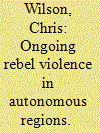|
|
|
Sort Order |
|
|
|
Items / Page
|
|
|
|
|
|
|
| Srl | Item |
| 1 |
ID:
168950


|
|
|
|
|
| Summary/Abstract |
Conflict between returning refugees and nonmigrant populations is a pervasive yet frequently overlooked security issue in post-conflict societies. Although scholars have demonstrated how out-migration can regionalize, prolong, and intensify civil war, the security consequences of return migration are undertheorized. An analysis of refugee return to Burundi after the country's 1993–2005 civil war corroborates a new theory of return migration and conflict: return migration creates new identity divisions based on whether and where individuals were displaced during wartime. These cleavages become new sources of conflict in the countries of origin when local institutions, such as land codes, citizenship regimes, or language laws, yield differential outcomes for individuals based on where they lived during the war. Ethnographic evidence gathered in Burundi and Tanzania from 2014 to 2016 shows how the return of refugees created violent rivalries between returnees and nonmigrants. Consequently, when Burundi faced a national-level political crisis in 2015, prior experiences of return shaped both the character and timing of out-migration from Burundi. Illuminating the role of reverse population movements in shaping future conflict extends theories of political violence and demonstrates why breaking the cycle of return and repeat displacement is essential to the prevention of conflict.
|
|
|
|
|
|
|
|
|
|
|
|
|
|
|
|
| 2 |
ID:
145752


|
|
|
|
|
| Summary/Abstract |
In the large body of literature on the granting of regional autonomy to end insurgency, an important related question has received little attention: what happens to other ethnic groups within the autonomous region? The new arrangement may end violence between the state and the guerrillas but will the latter simply turn their guns on other groups in the area? This article begins to fill this gap in the literature through a close examination of two mass killings conducted by rebels awarded an autonomous region in western Assam, Northeast India. Why would these militants—having won such far-reaching political and economic rewards after a decade of civil war—continue violence and risk these hard-won gains? I propose that violence against other ethnic communities in the new region is more likely in the presence of two main conditions. First, when the community receiving autonomy is a minority in the new region, and second, when only one militant faction is awarded power.
|
|
|
|
|
|
|
|
|
|
|
|
|
|
|
|
| 3 |
ID:
189353


|
|
|
|
|
| Summary/Abstract |
Violence in post-conflict settings is often attributed to a post-war boom in organized crime, facilitated by the demobilization of armed groups and the persisting weakness of the state. The article argues that this is only one pathway of post-conflict violence. A second causal pathway emerges from the challenges that peace processes can constitute for entrenched local political orders. By fostering political inclusion, the implementation of peace agreements may threaten subnational political elites that have used the context of armed conflict to ally with armed non-state actors. Violence is then used as a means to preserve such de facto authoritarian local orders. We start from the assumption that these two explanations are not exclusive or competing, but grasp different causal processes that may well both be at work behind the assassination of social leaders (líderes sociales) in Colombia since the 2016 peace agreement with the FARC guerrilla. We argue that this specific type of targeted violence can, in fact, be attributed to different, locally specific configurations that resemble the two pathways. The article combines fuzzy-set Qualitative Comparative Analysis with the case studies of the municipalities of Sardinata and Suárez to empirically establish and illustrate the two pathways.
|
|
|
|
|
|
|
|
|
|
|
|
|
|
|
|
| 4 |
ID:
189911


|
|
|
|
|
| Summary/Abstract |
This article explores how disruptive political conflicts evolve in peace processes by studying Colombian human rights defenders’ discourses about the peace process with the FARC-EP. While post-conflict scholarship has predominantly discussed violence and societal frictions as caused by legacies of war or flawed peace governance, I focus on the confrontations over political imaginaries that are endemic to peace processes. Through the lens of post-foundational discourse theory, I read the peace process as hegemonic crisis. This allows me to unpack the entanglement of political change and conflict, to which my discussions with human rights defenders allude: On the one hand, the peace agreement opened a political moment, in which it seemed possible to leave behind the hitherto hegemonic imaginary of the conflict as terrorism that had protracted the ‘state of war’; the advocacy for peace with social justice, on the other hand, it restaged historical confrontations with elites of the political right as antagonistic conflict over the meaning of peace. My analysis not only challenges the paradigm of war-to-peace transition, but also defines discursive conditions under which disruptive conflicts turn a peace process into an enduring interregnum, where the dawn of the post-conflict epoch is perpetually deferred and activist lives are threatened.
|
|
|
|
|
|
|
|
|
|
|
|
|
|
|
|
|
|
|
|
|